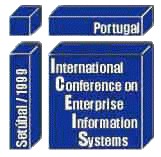 ICEIS'99
ICEIS'99 ICEIS'99
ICEIS'99
1st International Conference on Enterprise Information Systems
Setúbal, PORTUGAL
27-30 March, 1999
Status & Challenges for Multi-Agent Coordination
Technology
by
Mark Klein, PhD
Center for Coordination Science
Sloan School of Management
Massachusetts Institute of Technology
One Amherst Street E40-169
Cambridge MA 02139
Objectives:
Complex computing systems are increasingly being implemented as
distributed collections of cooperating human and computational agents because of the large
scale and inherently distributed nature of the problems now being addressed. The
advantages of this distributed approach are many: they include simplified knowledge
acquisition, increased performance, increased
tolerance for failure of system components, reduced "brittleness" (i.e. the
ability to handle a wider range of problems) and so on. This evolution has raised
important new issues, however, concerning how such multi-agent systems can be coordinated
productively.
The objective of this tutorial is to critically review the current state of the art of
computer-based multi-agent coordination support technology, and help participants better
understand the key challenges and emerging solutions that are being identified by
artificial intelligence and related fields. The tutorial will examine, in particular, the three main classes of coordination
technology: process management, dependency capture and exception management. We will
review the problems they are designed for, their functionality, areas of applicability,
strengths and weaknesses. The key future challenges and emerging solutions for these
technologies will be identified from the perspective of basic research undertaken in distributed artificial
intelligence and related fields. (See tutorial outline below for more detail).
Structure:
The tutorial takes the form of roughly 150 PowerPoint slides (from which I select a subset to present based on the background of the audience) plus 15 minutes of video segments. All slides include substantive notes that summarize the content of that slide (useful for people who are not native English speakers) and provide literature and Web citations to relevant work.
Section 1: Why Do We Need Coordination Technology? This section discusses how increasing coordination complexity in large scale collaborative work is overwhelming current (mainly manual) approaches, leading to severe impacts on cost, quality and schedule.
Section 2: The Types of Coordination Technology This section discusses
the key insight that the need for coordination is created by the existence of dependencies
between distributed activities,
and identifies the three kinds of coordination technology (process, exception and
dependency management) that have emerged to address these challenges.
Section 3: Process Management This section gives an overview, with numerous specific examples, of the space of computational coordination mechanisms, ranging from pre-defined process models to emergent behavior between "socially aware" deliberative agents, and discusses key lessons as well as directions for future work.
Section 4: Exception Management This section describes technology aimed at enhancing the ability of multi-agent systems to respond effectively to dynamism (errors, resource changes, requirements changes etc) in agents systems and the environment they operate in. Key lessons and directions for future work are described.
Section 5: Dependency Capture This section discusses technology for dependency capture, which is a key infrastructure for coordination mechanisms whose job is to attempt to optimize multi-agent system performance in the context of these inter-task dependencies. Key lessons and directions for future work are described.
Section 6: Future Challenges This section discusses overall challenges for future development in multi-agent coordination technologies, including integrating these technologies and developing more "socialized" agent infrastructures.